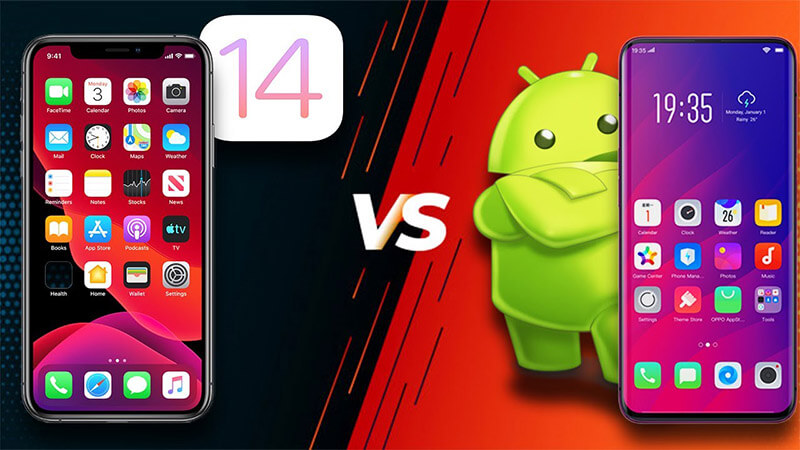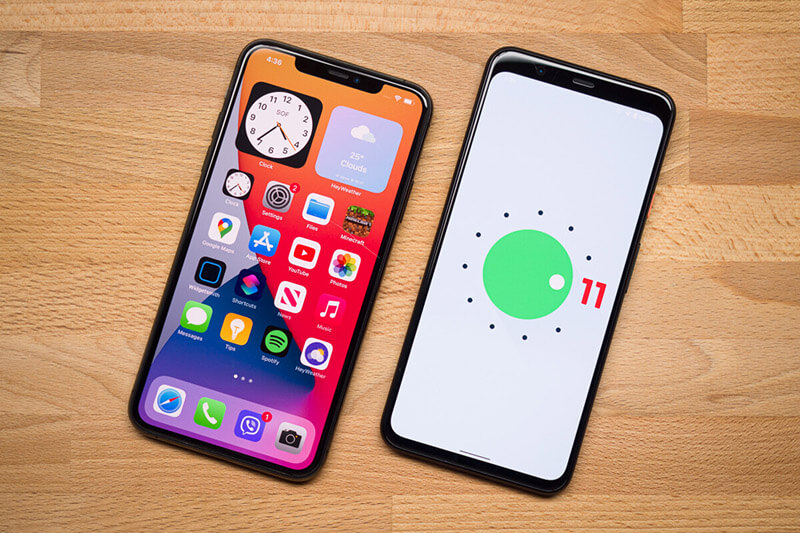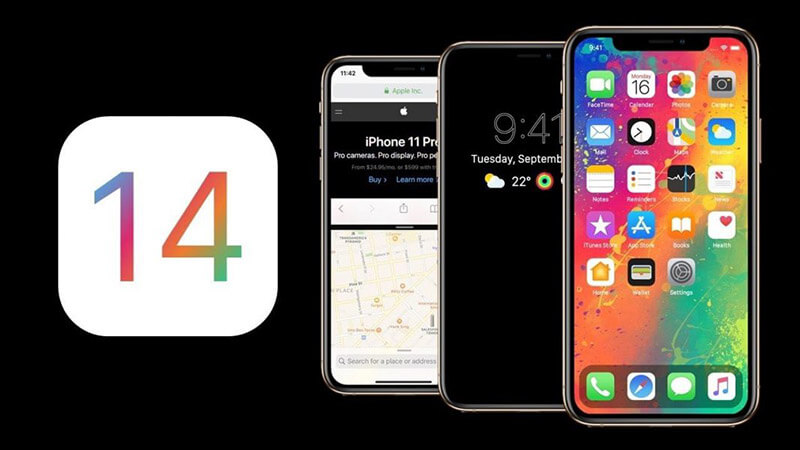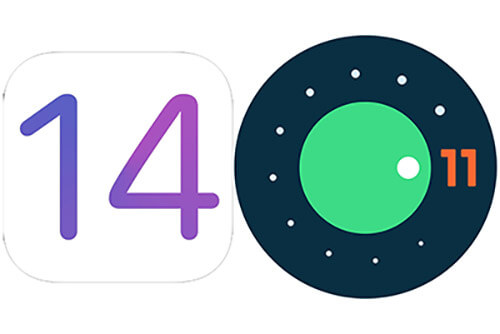Android 11 vs iOS 14: New Feature Comparision
Apr 27, 2022 • Filed to: Latest News & Tactics About Smart Phones • Proven solutions
Google and Apple are giant competitors in developing a smartphone operating system for the past decade. Both companies are integrating quality of life updates for every next OS developed for the majority devices. These changes are focused on implementing prior features and functionalities while innovations are also integrated unveiled to upgrade user experience, improved privacy, among others. Google’s Android 11 and apple's iOS are the latest that we have in 2020.

Release dates and specifications
Google released their android 11 operating system on September 8, 2020. Prior to this release, Google launches a beta version to test the software stability among other concerns steered towards developing the best features for android 11.
Before diving deeper into comparing android 11 to iOS 14, here are the new essential features in android 11:
- One-time app permission
- Chat bubbles
- Priority on conversations
- Screen recording
- Support foldable devices
- App suggestions
- Device payments and device control

On the other hand, Apple Inc. released iOS 14 on September 16, 2020, a few days after Google launched Android 11. The beta version was launched on June 22, 2020. The following new features in iOS 14 that bring the fresh new look include the following:
- Emoji search
- Picture in picture mode
- App library
- Redesigned Apple music
- Custom widget stacks
- Compact phone calls
- Homekit control centre
- QuickTake video, and many more.

New features comparison

1) Interface and usability
Both android and iOS offer varying complexity levels on their interfaces, which affects usability. The complexity is determined by the ease of search and access features and apps and customization options.
As compared to IOS 14, Google takes a seemingly more comprehensive approach to access menus and settings among different devices. However, there are multiple customization options on android 11 than is in iOS 14 to make the user interface easier.
IOS 14 comes with well-designed widgets and a new app library that can be easily customized to a large enough size. Grouping and organizing apps are automatic on iOS 14. Similarly, Apple integrated a superior search option. The search results are nicely distinguished for easy access and quicker action. This unveils a more polished experienced that is in android 11.
2) Homescreen
Android 11 introduced a new dock that displays recent apps. The sections also suggest apps the user is likely to use at that time. However, the rest of the android 11 home screen is much unchanged, but the user can customize as much as they want to improve the usability experience.
Apple has worked pretty hard to reinvent the home screen on iOS 14. The introduction of widgets is a game-changer for iPhone fans. This means you can customize the home screen with vast options of widgets as opposed to prior iOS versions.
3) Accessibility
Both Google and Apple have worked on features that improve accessibility to features and enhanced functionalities in the newly released operating systems. Android 11 helped users with hearing disorders to read what’s said on the view using the live transcribe feature. Voice access, Talkback, and lookout are also significant features in android 11 to improve accessibility.
The accessibility features included on iOS 14 include:
- VoiceOver screen reader
- Pointer control
- Voice control
- Magnifier
- Dictation
- Back tap.
4) Security and privacy
Both Android 11 and iOS 14 come with enhanced security and privacy. Android 11 has demonstrated decent records in safeguarding user data by including restrictive permissions to installed apps. Google addresses third party abuse.
Comparing iOS 14 privacy to android 11, Google does not beat apple even in prior versions. IOS 14 is a privacy-focused operating system. iPhone users are granted better control over apps that may be tracking in the background. When it comes to location, IOS14 provides exact details when sharing information rather than approximating, just like android does.
5) Messaging
The messaging app in IOS 14 grants users top features similar to those available in apps like telegram and Whatsapp. The emojis on the messages app is more appealing. Apple has introduced a couple of new emojis and animated stickers to make conversations lively.
Android 11 has introduced chat bubbles that hang on the screen to enable easy and quick reply. A picture of the sender appears on the bubble on the home screen. These bubbles work for all messaging apps on the phone. However, the user must customize the bubbles in the settings for them to launch automatically.
6) Parental controls
Both android 11 and iOS 14 unveil robust parental control. While IOS 14 gives you strong built-in parental controls, android 11 grants you room to install a third-party app easily. Apple lets you own the parental controls as you can use family sharing app with a passcode.
You can also use face time to restrict the apps, features, downloads, and purchases of explicit content.
On Android 11, you choose whether it’s a parent or kids' phone. You do not own the parental controls here. However, you can install third-party apps as well as use an app called family link to control the kids' device in various ways. You can view the device location, kids' activity, set screen limits of approving, and reject downloads using the family link feature.
7) Widgets
Widgets have been a fundamental feature in android operating systems. Android 11 has not done much development on widgets but gives vast room for users to customize to their expectations.
IOS 14, on the other hand, has hand interest in implementing widgets. iPhone users can now access information from their home screen without launching an app
8) Technology support
Google has been in the frontline in implementing new wireless technology in their android devices. For instance, android supported technology innovations like wireless charging, touchless voice commands, and 4G LTE before apple did. That said, android 11 supports 5G, while iOS 14 is seemingly waiting for this technology to be useful and reliable.
You Might Also Like
iPhone Problems
- iPhone Hardware Problems
- iPhone Home Button Problems
- iPhone Keyboard Problems
- iPhone Headphone Problems
- iPhone Touch ID Not Working
- iPhone Overheating
- iPhone Flashlight Not Working
- iPhone Silent Switch Not Working
- iPhone Sim Not Supported
- iPhone Software Problems
- iPhone Passcode Not Working
- Google Maps Not Working
- iPhone Screenshot Not Working
- iPhone Vibrate Not Working
- Apps Disappeared From iPhone
- iPhone Emergency Alerts Not Working
- iPhone Battery Percentage Not Showing
- iPhone App Not Updating
- Google Calendar not Syncing
- Health App Not Tracking Steps
- iPhone Auto Lock Not Working
- iPhone Battery Problems
- iPhone Media Problems
- iPhone Echo Problem
- iPhone Camera Black
- iPhone Won't Play Music
- iOS Video Bug
- iPhone Calling Problem
- iPhone Ringer Problem
- iPhone Camera Problem
- iPhone Front Camera Problem
- iPhone Not Ringing
- iPhone Not Sound
- iPhone Mail Problems
- Reset Voicemail Password
- iPhone Email Problems
- iPhone Email Disappeared
- iPhone Voicemail Not Working
- iPhone Voicemail Won't Play
- iPhone Can't get Mail connection
- Gmail Not Working
- Yahoo Mail Not Working
- iPhone Update Problems
- iPhone Stuck at the Apple Logo
- Software Update Failed
- iPhone Verifying Update
- Software Update Server Couldn't Be Contacted
- iOS update Problem
- iPhone Connection/Network Problems

Alice MJ
staff Editor